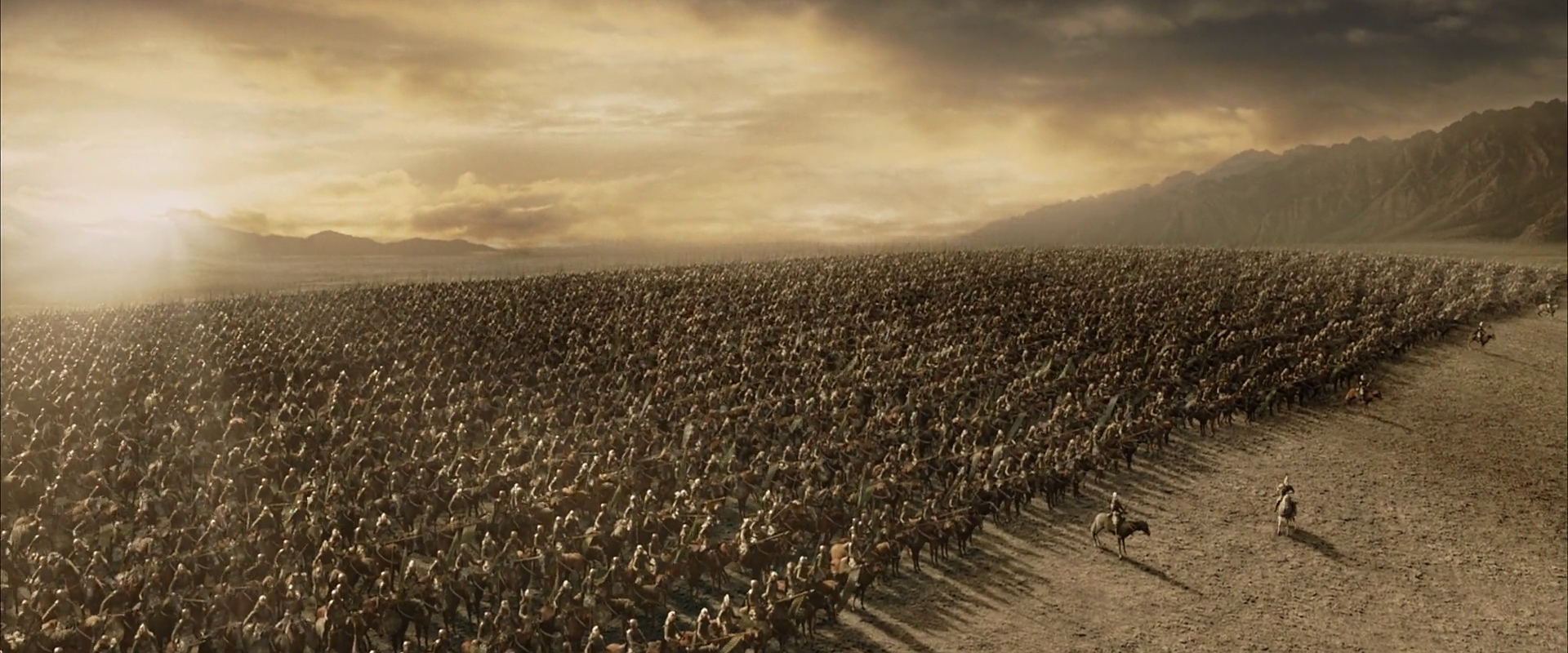Tolkien Tuesday: Minas Tirith and Plotting the Epic Battle
When you think of Lord of the Rings, one of the first things that come to your mind (after Viggo's perfect face) are the big battles. There's nothing quite like a relaxing afternoon watching orcs get dismembered while sipping your LaCroix.
You think to yourself, “I want to write a big battle, nothing says read my book more than besieged cities and struggling heroes!”
Well, you aren't wrong. I want to write that way too.
How do you get there, though? There are plenty of stories with big battles no one cares about.
You have to earn those scenes.
When we watch, or read, Lord of the Rings, the battles matter because we care about the characters in them. We hope in what they defend, and we want them to succeed. To get an audience to that point, you have a lot of groundwork to do first.
Step 1: Epic closeups in rain
I talk about characterization and worldbuilding in previous Tolkien Tuesdays, and I'm sure I'll have more on those subjects, but here we are going to look at one little thing: anticipation.
Now that I got that song stuck in your head (hey if I have to have it in there, so do you) let's look at what I mean by examining how Tolkien did it in the books.
One of the most notable things about the books is their strange layout (yes, I've bitched about this before, but I understand it more and more as I re-read).
Each book is divided into two halves. This is easy going in The Fellowship of the Ring, but gets complicated in the next two installments. To make matters worse, Tolkien loves internal conflict and building to later events more than ending his books on big battles.
Fellowship ends with Frodo and Sam escaping after Boromir has his meltdown, we don't see the Uruk-hai attack at all. Towers shows us the Helm's Deep battle a quarter into the book and ends with Sam making tough choices.
The action sequences you are used to from the movies seem like small po-ta-toes in the book. At least, in terms of dedicated narrative to some of them.
So what the hell Tolkien?
Tolkien’s theoretical reaction to that statement.
You start reading The Return of the King and finally realize everything was about getting to the Battle of Minas Tirith. Multiple chapters cover the many aspects of this epic battle, and you realize you just read through a hundred pages without blinking.
This is the pay off to all that anticipation.
And don't fool yourself, you loved that slow burn. Little by little all the plot strings have led to this moment. It's earned from the beginning, and that's why we read this series sixty-something years later.
You too can harness that power of escalation, just look at how Tolkien did it.
In the Fellowship, we start to see the severe situation in Gondor from Boromir complaining his ass off at the council of Elrond.
He actually makes some pretty good points, which is why his fall into corruption is a believable one. I mean the whole, let's take the thing the enemy wants most right into his backyard idea, is pretty bonkers.
That awkward moment when you realize your plan may have flaws.
Later in the same book, we see Boromir panicking about this concept. The Fellowship is at a crossroads and he will do anything to get the Ring to go to Minas Tirith, knowing its only a matter of time before it gets wrecked (literally).
Gondor is still far off here, something we are learning about and intrigued by, especially since one of the characters is supposed to be made the king of it. The little taster of ice cream that ensures we definitely want two full scoops, none of that half scoop crap.
In the Two Towers, Aragorn keeps wishing he could go south and fulfill his destiny. We begin to wish that too as we read, especially when you realize all this work in Rohan is simply to free them up to help out Gondor.
All of it will be for nothing if Minas Tirith falls. No pressure.
The last we see of Gandalf and Pippen is a blur of two riders on Shadowfax desperate to get to Minas Tirith before it's too late. That will be a constant theme from here on out. Will everyone that needs to get to the upcoming battle get there in time? We eat that up reading through those scenes.
In the second book, we also get to see more of the movements of Sauron. Frodo, Sam, and def not sneaking Gollum watch armies of men answer the call to evil. There's always plenty of men applying for that job it seems.
Frodo and crew also meet Faramir and company who are constantly doing the thankless work of keeping the enemy at bay. Usually with arrows.
This is all to keep Minas Tirith safe from the growing strength of Mordor, and there is a depressing understanding that their work is only slightly delaying the inevitable.
Faramir then goes on a super cool speech about Gondor that I referenced in the last Tolkien Tuesday and we get more and more about this Minas Tirith place and the culture behind it. It's something beautiful and withering at the same time.
We begin to want to protect it ourselves as we read on.
Then, the armies of Mordor are unleashed towards the end of the Two Towers. We know the darkness is coming and heading right for the city we just got motivated about. The King of the Nazgul leads this terrible force, and there's some doubt about how the city will last against it.
This timing is so purposeful for Tolkien. He's got you, and he knows it.
By the time you even start Return of the King, you are salivating for that big battle.
Tolkien still teases you for a while. Didn't think you would ever read that sentence, did you? Tolkien teasing you, that's an image.
Probably said that at some point…
Aragorn challenges Sauron, revealing who he really is in the Palantir that even Gandalf was afraid to use. Then Aragorn takes the Paths of the Dead that were named pretty purposefully.
That mystery involves helping free up Gondor's southern forces, and we don't get to see if they are successful until they show up on the battlefield. And you guessed it, this adds yet another layer of anticipation.
Rohan receives the Red Arrow, meaning Gondor is in some deep shit and is pretty desperate. Now Rohan needs to ride without their full compliment.
We become less sure of any hope. The darkness is growing page by page.
Tolkien intertwines all of this with Faramir fighting off orcs approaching the city and a darkness that stretches out from Mordor because Sauron is all about that branding.
The breath before the plunge.
You have gone through two and a half books to get here. The great battle of our time. Well, their time, I guess.
The whole thing then plays out for you. The siege of the walls, Grond and the Witch King smashing through the gates, the charge of the Rohirrim, the badassery of Eowyn, and the actual return of the King are all earned.
Every word of this conflict has been carefully plotted, a route on a map followed precisely.
And that’s actually a real one!
If you want a conflict like this one in your story, don't jump the gun.
Yes, have excitement, intrigue, characterization, betrayal, and hope, but with a reason for it all. It's not obvious at first, but Tolkien has a reason the plot develops the way that it does. He's banking on this major battle being the centerpiece of the entire series.
Developing a plot is more than just a series of events that culminates in a climax.
Those events have an orbit. The climax has a gravitational pull. All roads should lead to it, even if they don't seem like they should be related.
Writing with purpose is the difference between a book getting published or passed up.
Why am I, the reader, going to invest in these plot points with no payoff?
Where is this all going?
Look at your story through the reader's eyes. When Tolkien thought up the battle of Minas Tirith, I doubt he thought, "hmm, that's neat, I'll throw that in somewhere." He made sure that there was a narrative push, specifically in that direction that hooks the reader step by step.
And look at you, you want to go read those intense chapters, and the journey there, again and again. You want to see how the whole series leads to this moment.
Thanks to that anticipation that Tolkien built in his readers, we get to see it on the big screen. Other creators were inspired by this moment.
Don't you want that as a writer?
Then patience is the key. Lead your audience to that kick-ass scene you've been thinking of for years.
Ask yourself, is my plot orbiting this? Do the roads have purpose up to this point?
Start with the characters involved in that climactic moment and revel as your audience keeps turning the pages for more.
Arise! Arise writers of Theoden! (Sorry I couldn't resist, the Ring could just tempt me with puns, and I would give in every time).
Hook your reader with the opening scene. Then the scene after that. Then the next one.
Create a slippery slope that leads to the epic battle.
Don't let go, and neither will they.
If this helped, there’s plenty more Tolkien to gush about (that will also make you a better writer). Sign up for my geeky newsletter below:













